Mental Health Treatment Report: Psychosocial Issues in Mark's Case
VerifiedAdded on 2023/03/31
|8
|1840
|439
Report
AI Summary
This report provides an analysis of a case study focusing on mental health treatment. It begins by examining the psychosocial issues faced by a patient named Mark, who exhibits symptoms indicative of schizophrenia, including declining academic performance, auditory hallucinations, social withdrawal, and paranoid thoughts. The report then explores the importance of both informal support, primarily from family members, and the role of various professionals in the care process, including psychiatrists, psychologists, and social workers. It highlights the benefits of cognitive behavioral therapy and the role of social workers in improving social inclusion. The report also addresses gaps in service delivery, such as cost barriers and inadequate policies, and proposes advocacy measures to improve mental health care, including increased funding, legislative changes, and public awareness campaigns. References from various studies are included to support the arguments presented.

Running head: MENTAL HEALTH TREATMENT
Mental Health Treatment
Name of the Student
Name of the University
Author Note
Mental Health Treatment
Name of the Student
Name of the University
Author Note
Paraphrase This Document
Need a fresh take? Get an instant paraphrase of this document with our AI Paraphraser
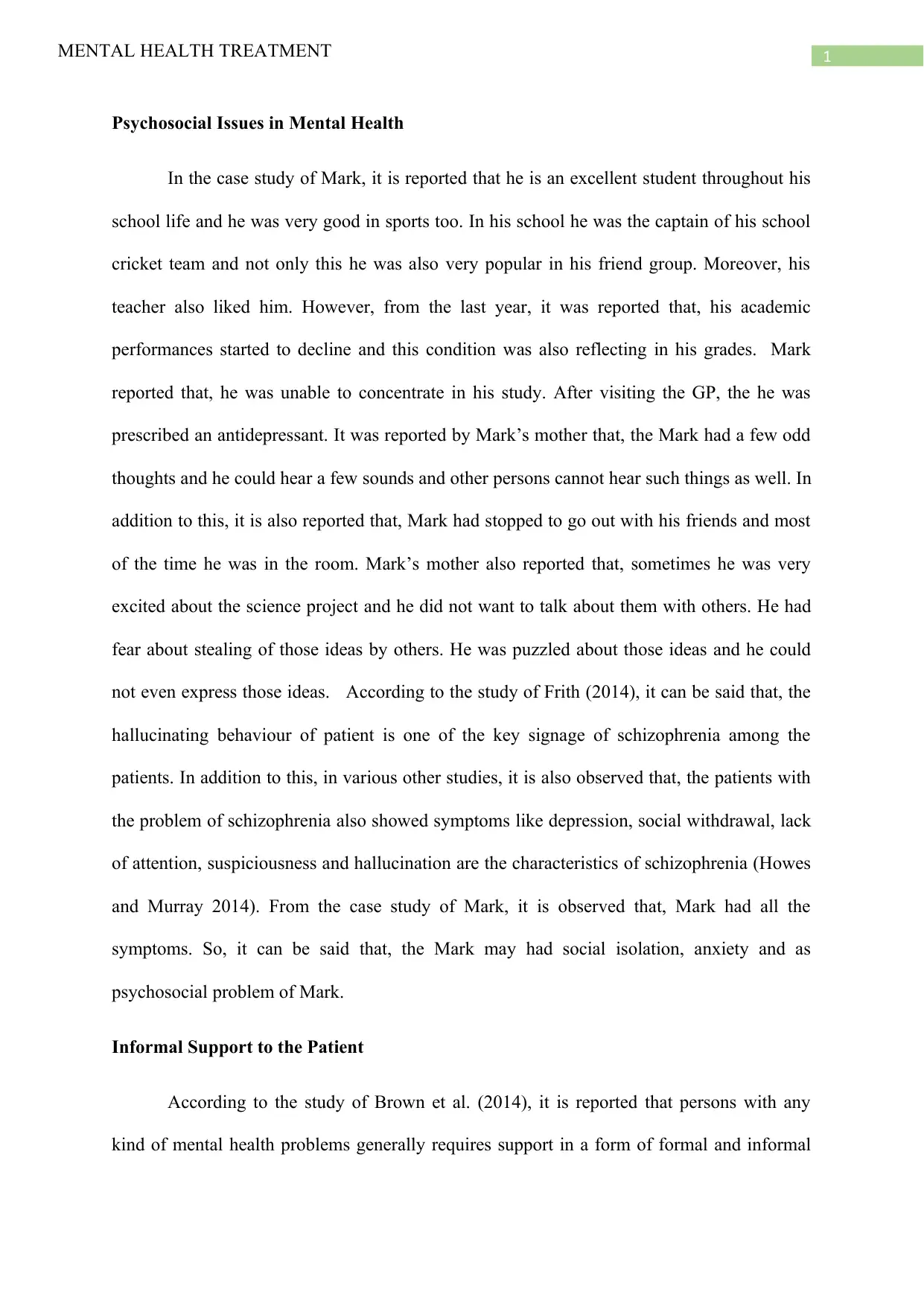
1MENTAL HEALTH TREATMENT
Psychosocial Issues in Mental Health
In the case study of Mark, it is reported that he is an excellent student throughout his
school life and he was very good in sports too. In his school he was the captain of his school
cricket team and not only this he was also very popular in his friend group. Moreover, his
teacher also liked him. However, from the last year, it was reported that, his academic
performances started to decline and this condition was also reflecting in his grades. Mark
reported that, he was unable to concentrate in his study. After visiting the GP, the he was
prescribed an antidepressant. It was reported by Mark’s mother that, the Mark had a few odd
thoughts and he could hear a few sounds and other persons cannot hear such things as well. In
addition to this, it is also reported that, Mark had stopped to go out with his friends and most
of the time he was in the room. Mark’s mother also reported that, sometimes he was very
excited about the science project and he did not want to talk about them with others. He had
fear about stealing of those ideas by others. He was puzzled about those ideas and he could
not even express those ideas. According to the study of Frith (2014), it can be said that, the
hallucinating behaviour of patient is one of the key signage of schizophrenia among the
patients. In addition to this, in various other studies, it is also observed that, the patients with
the problem of schizophrenia also showed symptoms like depression, social withdrawal, lack
of attention, suspiciousness and hallucination are the characteristics of schizophrenia (Howes
and Murray 2014). From the case study of Mark, it is observed that, Mark had all the
symptoms. So, it can be said that, the Mark may had social isolation, anxiety and as
psychosocial problem of Mark.
Informal Support to the Patient
According to the study of Brown et al. (2014), it is reported that persons with any
kind of mental health problems generally requires support in a form of formal and informal
Psychosocial Issues in Mental Health
In the case study of Mark, it is reported that he is an excellent student throughout his
school life and he was very good in sports too. In his school he was the captain of his school
cricket team and not only this he was also very popular in his friend group. Moreover, his
teacher also liked him. However, from the last year, it was reported that, his academic
performances started to decline and this condition was also reflecting in his grades. Mark
reported that, he was unable to concentrate in his study. After visiting the GP, the he was
prescribed an antidepressant. It was reported by Mark’s mother that, the Mark had a few odd
thoughts and he could hear a few sounds and other persons cannot hear such things as well. In
addition to this, it is also reported that, Mark had stopped to go out with his friends and most
of the time he was in the room. Mark’s mother also reported that, sometimes he was very
excited about the science project and he did not want to talk about them with others. He had
fear about stealing of those ideas by others. He was puzzled about those ideas and he could
not even express those ideas. According to the study of Frith (2014), it can be said that, the
hallucinating behaviour of patient is one of the key signage of schizophrenia among the
patients. In addition to this, in various other studies, it is also observed that, the patients with
the problem of schizophrenia also showed symptoms like depression, social withdrawal, lack
of attention, suspiciousness and hallucination are the characteristics of schizophrenia (Howes
and Murray 2014). From the case study of Mark, it is observed that, Mark had all the
symptoms. So, it can be said that, the Mark may had social isolation, anxiety and as
psychosocial problem of Mark.
Informal Support to the Patient
According to the study of Brown et al. (2014), it is reported that persons with any
kind of mental health problems generally requires support in a form of formal and informal
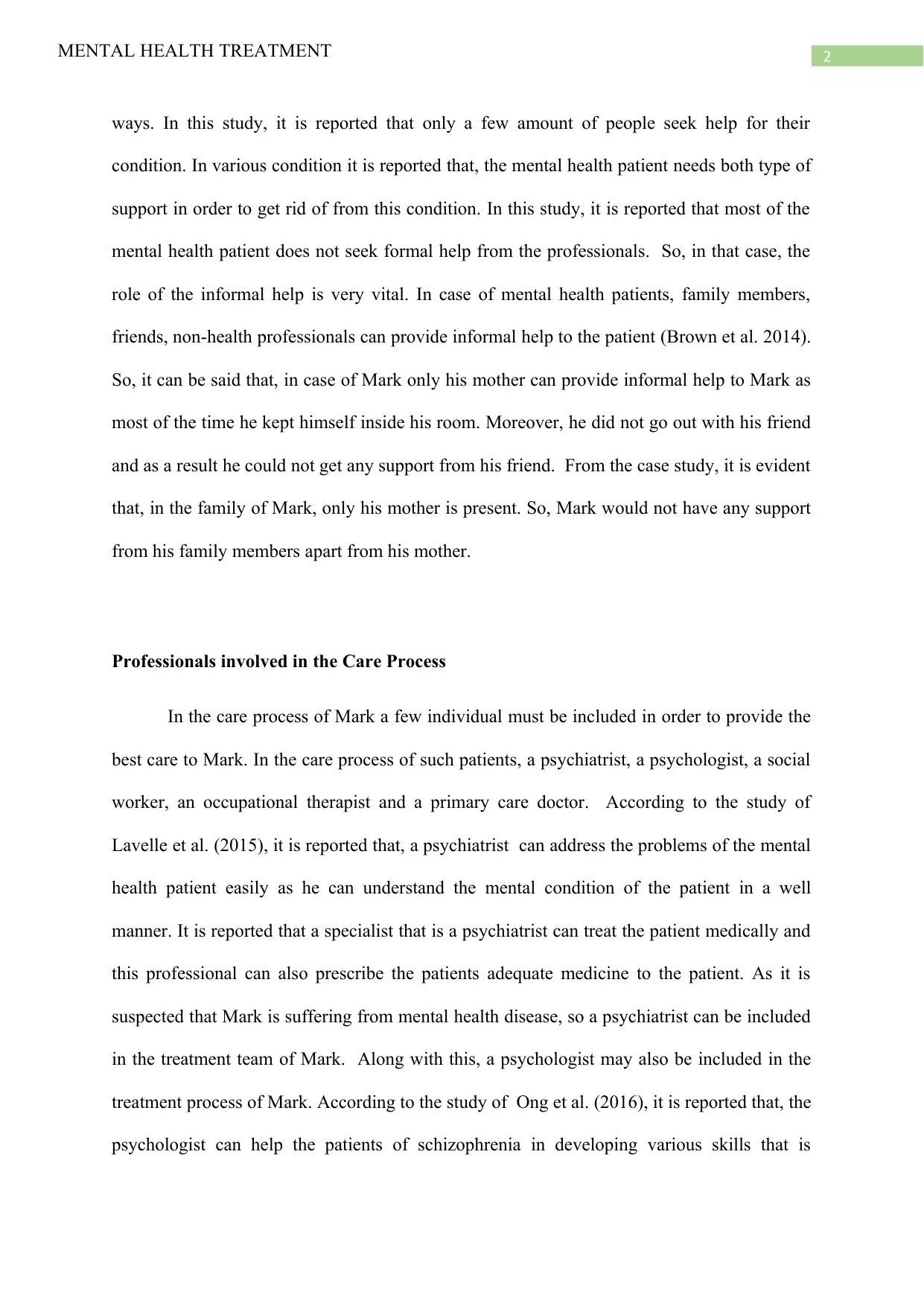
2MENTAL HEALTH TREATMENT
ways. In this study, it is reported that only a few amount of people seek help for their
condition. In various condition it is reported that, the mental health patient needs both type of
support in order to get rid of from this condition. In this study, it is reported that most of the
mental health patient does not seek formal help from the professionals. So, in that case, the
role of the informal help is very vital. In case of mental health patients, family members,
friends, non-health professionals can provide informal help to the patient (Brown et al. 2014).
So, it can be said that, in case of Mark only his mother can provide informal help to Mark as
most of the time he kept himself inside his room. Moreover, he did not go out with his friend
and as a result he could not get any support from his friend. From the case study, it is evident
that, in the family of Mark, only his mother is present. So, Mark would not have any support
from his family members apart from his mother.
Professionals involved in the Care Process
In the care process of Mark a few individual must be included in order to provide the
best care to Mark. In the care process of such patients, a psychiatrist, a psychologist, a social
worker, an occupational therapist and a primary care doctor. According to the study of
Lavelle et al. (2015), it is reported that, a psychiatrist can address the problems of the mental
health patient easily as he can understand the mental condition of the patient in a well
manner. It is reported that a specialist that is a psychiatrist can treat the patient medically and
this professional can also prescribe the patients adequate medicine to the patient. As it is
suspected that Mark is suffering from mental health disease, so a psychiatrist can be included
in the treatment team of Mark. Along with this, a psychologist may also be included in the
treatment process of Mark. According to the study of Ong et al. (2016), it is reported that, the
psychologist can help the patients of schizophrenia in developing various skills that is
ways. In this study, it is reported that only a few amount of people seek help for their
condition. In various condition it is reported that, the mental health patient needs both type of
support in order to get rid of from this condition. In this study, it is reported that most of the
mental health patient does not seek formal help from the professionals. So, in that case, the
role of the informal help is very vital. In case of mental health patients, family members,
friends, non-health professionals can provide informal help to the patient (Brown et al. 2014).
So, it can be said that, in case of Mark only his mother can provide informal help to Mark as
most of the time he kept himself inside his room. Moreover, he did not go out with his friend
and as a result he could not get any support from his friend. From the case study, it is evident
that, in the family of Mark, only his mother is present. So, Mark would not have any support
from his family members apart from his mother.
Professionals involved in the Care Process
In the care process of Mark a few individual must be included in order to provide the
best care to Mark. In the care process of such patients, a psychiatrist, a psychologist, a social
worker, an occupational therapist and a primary care doctor. According to the study of
Lavelle et al. (2015), it is reported that, a psychiatrist can address the problems of the mental
health patient easily as he can understand the mental condition of the patient in a well
manner. It is reported that a specialist that is a psychiatrist can treat the patient medically and
this professional can also prescribe the patients adequate medicine to the patient. As it is
suspected that Mark is suffering from mental health disease, so a psychiatrist can be included
in the treatment team of Mark. Along with this, a psychologist may also be included in the
treatment process of Mark. According to the study of Ong et al. (2016), it is reported that, the
psychologist can help the patients of schizophrenia in developing various skills that is
⊘ This is a preview!⊘
Do you want full access?
Subscribe today to unlock all pages.

Trusted by 1+ million students worldwide
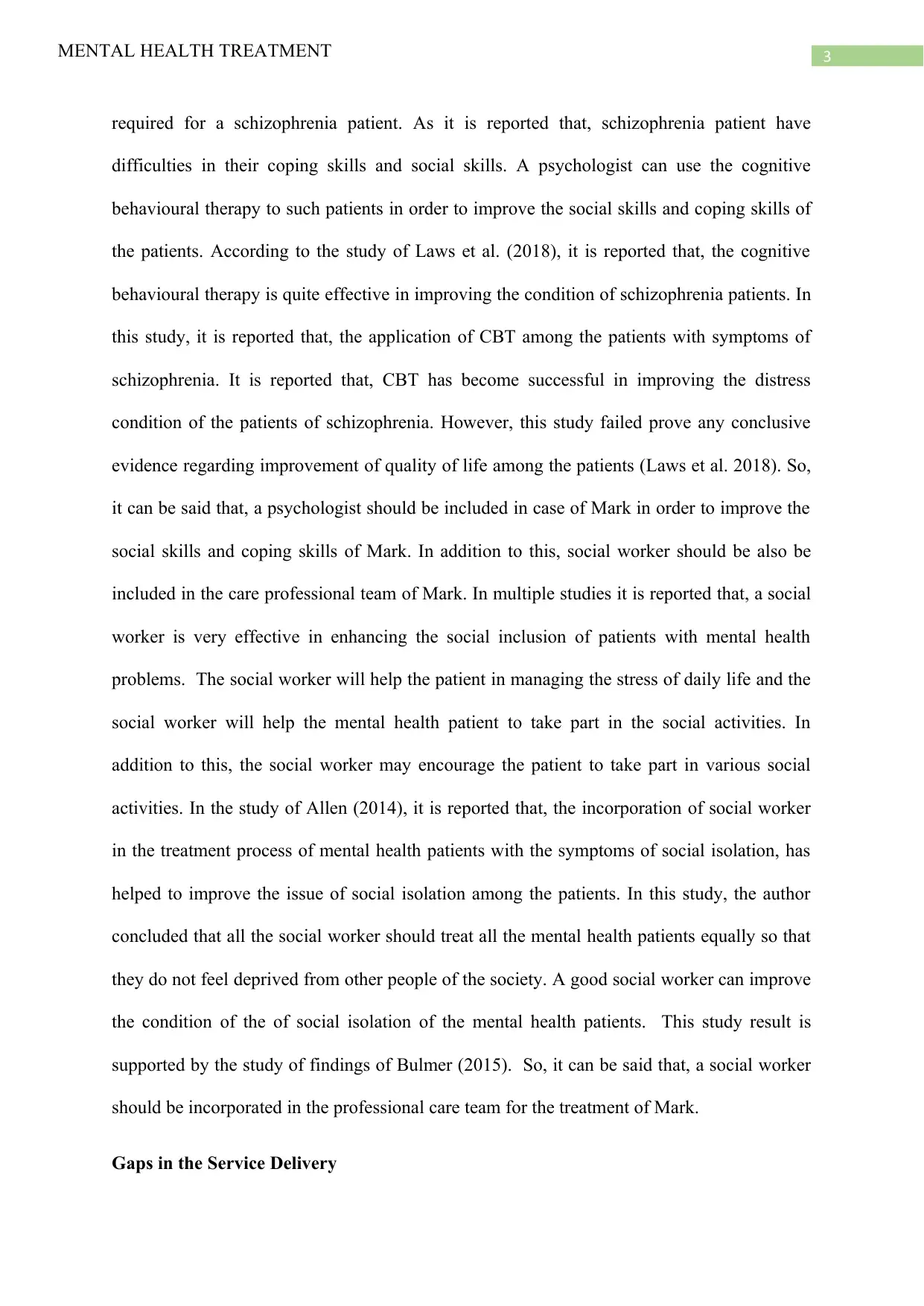
3MENTAL HEALTH TREATMENT
required for a schizophrenia patient. As it is reported that, schizophrenia patient have
difficulties in their coping skills and social skills. A psychologist can use the cognitive
behavioural therapy to such patients in order to improve the social skills and coping skills of
the patients. According to the study of Laws et al. (2018), it is reported that, the cognitive
behavioural therapy is quite effective in improving the condition of schizophrenia patients. In
this study, it is reported that, the application of CBT among the patients with symptoms of
schizophrenia. It is reported that, CBT has become successful in improving the distress
condition of the patients of schizophrenia. However, this study failed prove any conclusive
evidence regarding improvement of quality of life among the patients (Laws et al. 2018). So,
it can be said that, a psychologist should be included in case of Mark in order to improve the
social skills and coping skills of Mark. In addition to this, social worker should be also be
included in the care professional team of Mark. In multiple studies it is reported that, a social
worker is very effective in enhancing the social inclusion of patients with mental health
problems. The social worker will help the patient in managing the stress of daily life and the
social worker will help the mental health patient to take part in the social activities. In
addition to this, the social worker may encourage the patient to take part in various social
activities. In the study of Allen (2014), it is reported that, the incorporation of social worker
in the treatment process of mental health patients with the symptoms of social isolation, has
helped to improve the issue of social isolation among the patients. In this study, the author
concluded that all the social worker should treat all the mental health patients equally so that
they do not feel deprived from other people of the society. A good social worker can improve
the condition of the of social isolation of the mental health patients. This study result is
supported by the study of findings of Bulmer (2015). So, it can be said that, a social worker
should be incorporated in the professional care team for the treatment of Mark.
Gaps in the Service Delivery
required for a schizophrenia patient. As it is reported that, schizophrenia patient have
difficulties in their coping skills and social skills. A psychologist can use the cognitive
behavioural therapy to such patients in order to improve the social skills and coping skills of
the patients. According to the study of Laws et al. (2018), it is reported that, the cognitive
behavioural therapy is quite effective in improving the condition of schizophrenia patients. In
this study, it is reported that, the application of CBT among the patients with symptoms of
schizophrenia. It is reported that, CBT has become successful in improving the distress
condition of the patients of schizophrenia. However, this study failed prove any conclusive
evidence regarding improvement of quality of life among the patients (Laws et al. 2018). So,
it can be said that, a psychologist should be included in case of Mark in order to improve the
social skills and coping skills of Mark. In addition to this, social worker should be also be
included in the care professional team of Mark. In multiple studies it is reported that, a social
worker is very effective in enhancing the social inclusion of patients with mental health
problems. The social worker will help the patient in managing the stress of daily life and the
social worker will help the mental health patient to take part in the social activities. In
addition to this, the social worker may encourage the patient to take part in various social
activities. In the study of Allen (2014), it is reported that, the incorporation of social worker
in the treatment process of mental health patients with the symptoms of social isolation, has
helped to improve the issue of social isolation among the patients. In this study, the author
concluded that all the social worker should treat all the mental health patients equally so that
they do not feel deprived from other people of the society. A good social worker can improve
the condition of the of social isolation of the mental health patients. This study result is
supported by the study of findings of Bulmer (2015). So, it can be said that, a social worker
should be incorporated in the professional care team for the treatment of Mark.
Gaps in the Service Delivery
Paraphrase This Document
Need a fresh take? Get an instant paraphrase of this document with our AI Paraphraser
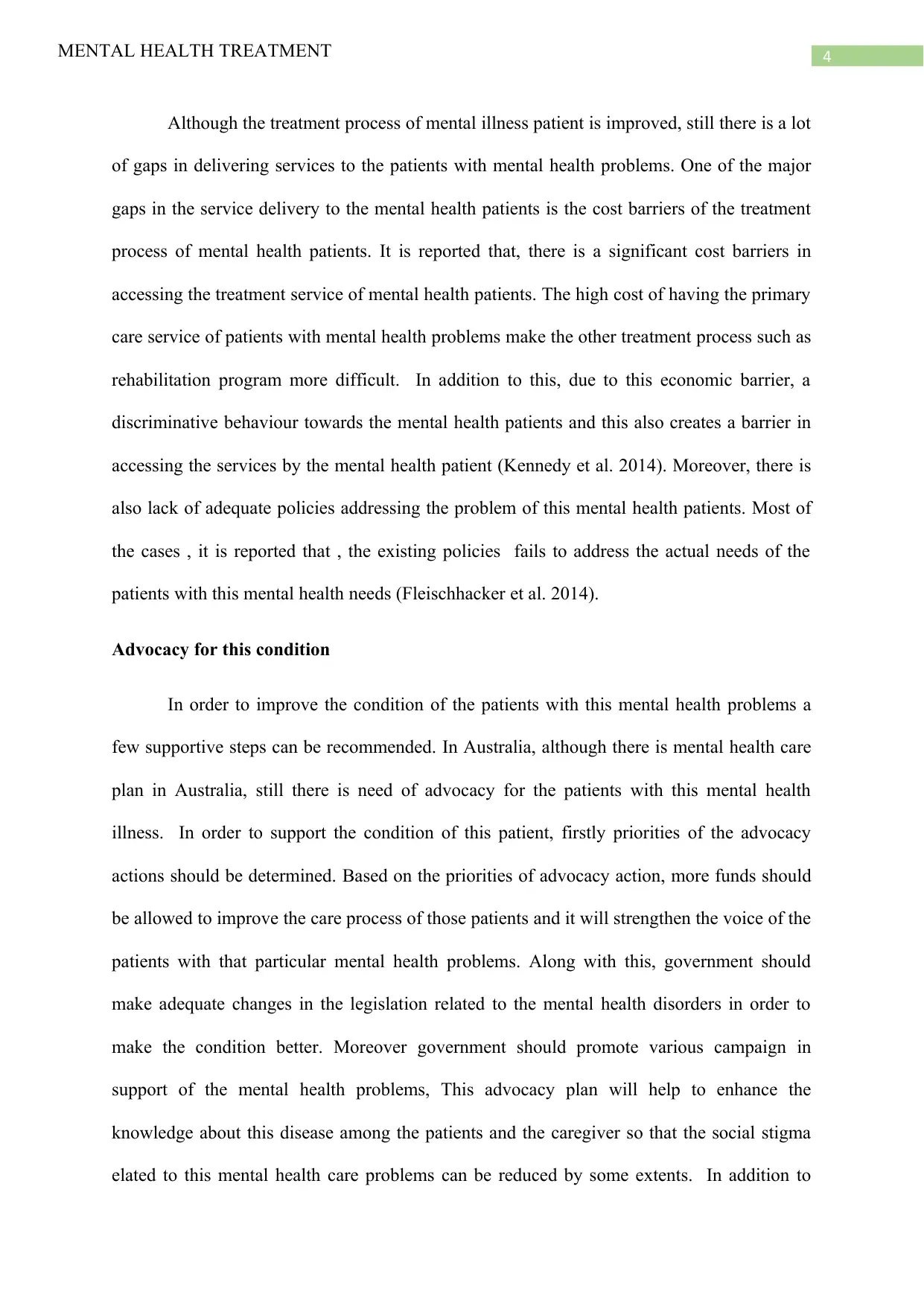
4MENTAL HEALTH TREATMENT
Although the treatment process of mental illness patient is improved, still there is a lot
of gaps in delivering services to the patients with mental health problems. One of the major
gaps in the service delivery to the mental health patients is the cost barriers of the treatment
process of mental health patients. It is reported that, there is a significant cost barriers in
accessing the treatment service of mental health patients. The high cost of having the primary
care service of patients with mental health problems make the other treatment process such as
rehabilitation program more difficult. In addition to this, due to this economic barrier, a
discriminative behaviour towards the mental health patients and this also creates a barrier in
accessing the services by the mental health patient (Kennedy et al. 2014). Moreover, there is
also lack of adequate policies addressing the problem of this mental health patients. Most of
the cases , it is reported that , the existing policies fails to address the actual needs of the
patients with this mental health needs (Fleischhacker et al. 2014).
Advocacy for this condition
In order to improve the condition of the patients with this mental health problems a
few supportive steps can be recommended. In Australia, although there is mental health care
plan in Australia, still there is need of advocacy for the patients with this mental health
illness. In order to support the condition of this patient, firstly priorities of the advocacy
actions should be determined. Based on the priorities of advocacy action, more funds should
be allowed to improve the care process of those patients and it will strengthen the voice of the
patients with that particular mental health problems. Along with this, government should
make adequate changes in the legislation related to the mental health disorders in order to
make the condition better. Moreover government should promote various campaign in
support of the mental health problems, This advocacy plan will help to enhance the
knowledge about this disease among the patients and the caregiver so that the social stigma
elated to this mental health care problems can be reduced by some extents. In addition to
Although the treatment process of mental illness patient is improved, still there is a lot
of gaps in delivering services to the patients with mental health problems. One of the major
gaps in the service delivery to the mental health patients is the cost barriers of the treatment
process of mental health patients. It is reported that, there is a significant cost barriers in
accessing the treatment service of mental health patients. The high cost of having the primary
care service of patients with mental health problems make the other treatment process such as
rehabilitation program more difficult. In addition to this, due to this economic barrier, a
discriminative behaviour towards the mental health patients and this also creates a barrier in
accessing the services by the mental health patient (Kennedy et al. 2014). Moreover, there is
also lack of adequate policies addressing the problem of this mental health patients. Most of
the cases , it is reported that , the existing policies fails to address the actual needs of the
patients with this mental health needs (Fleischhacker et al. 2014).
Advocacy for this condition
In order to improve the condition of the patients with this mental health problems a
few supportive steps can be recommended. In Australia, although there is mental health care
plan in Australia, still there is need of advocacy for the patients with this mental health
illness. In order to support the condition of this patient, firstly priorities of the advocacy
actions should be determined. Based on the priorities of advocacy action, more funds should
be allowed to improve the care process of those patients and it will strengthen the voice of the
patients with that particular mental health problems. Along with this, government should
make adequate changes in the legislation related to the mental health disorders in order to
make the condition better. Moreover government should promote various campaign in
support of the mental health problems, This advocacy plan will help to enhance the
knowledge about this disease among the patients and the caregiver so that the social stigma
elated to this mental health care problems can be reduced by some extents. In addition to

5MENTAL HEALTH TREATMENT
this, the cost of treatment should also be reduced for those patients. The enhancements of
amendments in the legislation will make the condition better as the government is directly
promoting the improvement process of this condition (Leguay 2016). So, it can be said that,
in order to improve the condition of the mental health patients, advocacy program should be
casted from the end of the government.
this, the cost of treatment should also be reduced for those patients. The enhancements of
amendments in the legislation will make the condition better as the government is directly
promoting the improvement process of this condition (Leguay 2016). So, it can be said that,
in order to improve the condition of the mental health patients, advocacy program should be
casted from the end of the government.
⊘ This is a preview!⊘
Do you want full access?
Subscribe today to unlock all pages.

Trusted by 1+ million students worldwide
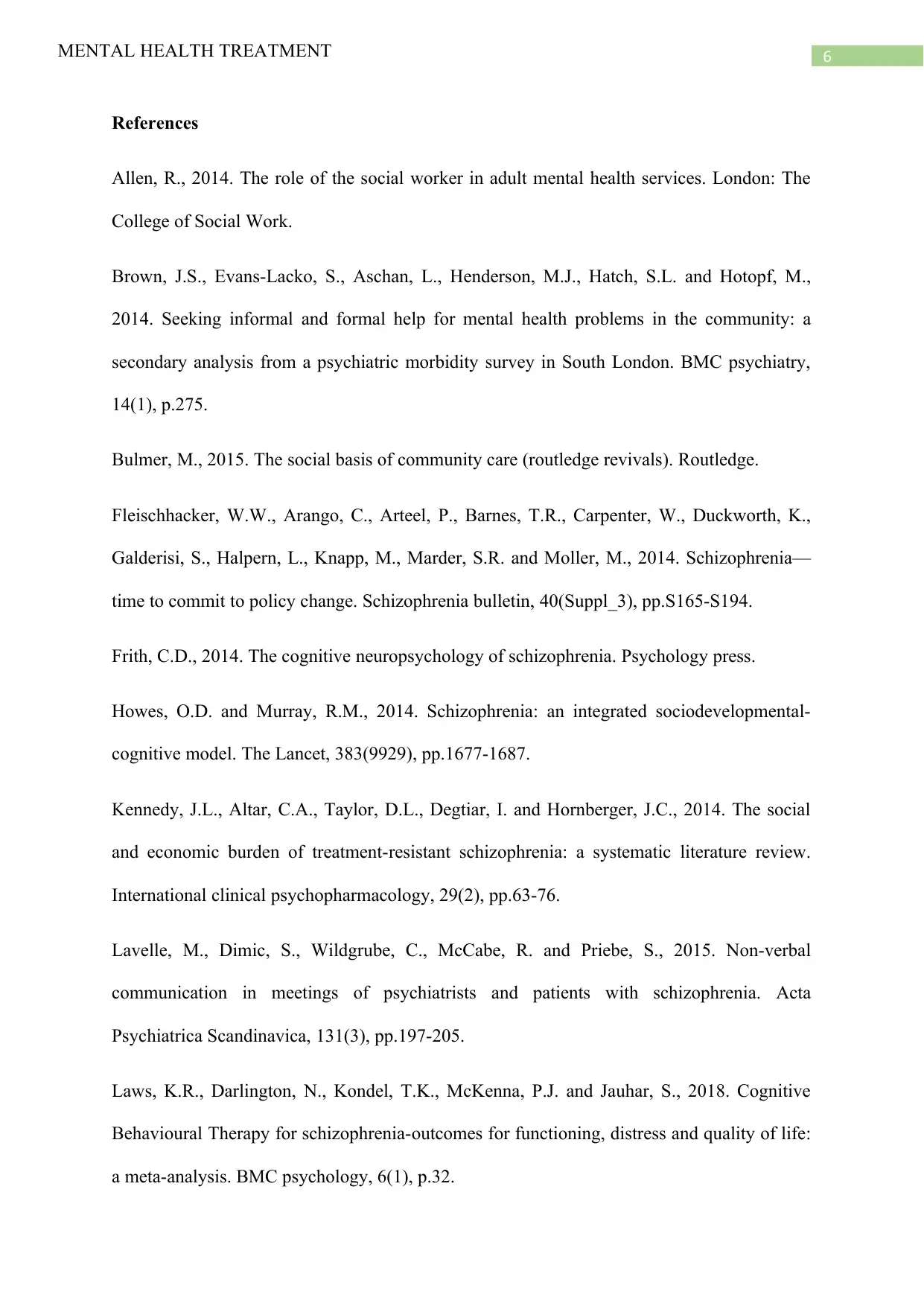
6MENTAL HEALTH TREATMENT
References
Allen, R., 2014. The role of the social worker in adult mental health services. London: The
College of Social Work.
Brown, J.S., Evans-Lacko, S., Aschan, L., Henderson, M.J., Hatch, S.L. and Hotopf, M.,
2014. Seeking informal and formal help for mental health problems in the community: a
secondary analysis from a psychiatric morbidity survey in South London. BMC psychiatry,
14(1), p.275.
Bulmer, M., 2015. The social basis of community care (routledge revivals). Routledge.
Fleischhacker, W.W., Arango, C., Arteel, P., Barnes, T.R., Carpenter, W., Duckworth, K.,
Galderisi, S., Halpern, L., Knapp, M., Marder, S.R. and Moller, M., 2014. Schizophrenia—
time to commit to policy change. Schizophrenia bulletin, 40(Suppl_3), pp.S165-S194.
Frith, C.D., 2014. The cognitive neuropsychology of schizophrenia. Psychology press.
Howes, O.D. and Murray, R.M., 2014. Schizophrenia: an integrated sociodevelopmental-
cognitive model. The Lancet, 383(9929), pp.1677-1687.
Kennedy, J.L., Altar, C.A., Taylor, D.L., Degtiar, I. and Hornberger, J.C., 2014. The social
and economic burden of treatment-resistant schizophrenia: a systematic literature review.
International clinical psychopharmacology, 29(2), pp.63-76.
Lavelle, M., Dimic, S., Wildgrube, C., McCabe, R. and Priebe, S., 2015. Non‐verbal
communication in meetings of psychiatrists and patients with schizophrenia. Acta
Psychiatrica Scandinavica, 131(3), pp.197-205.
Laws, K.R., Darlington, N., Kondel, T.K., McKenna, P.J. and Jauhar, S., 2018. Cognitive
Behavioural Therapy for schizophrenia-outcomes for functioning, distress and quality of life:
a meta-analysis. BMC psychology, 6(1), p.32.
References
Allen, R., 2014. The role of the social worker in adult mental health services. London: The
College of Social Work.
Brown, J.S., Evans-Lacko, S., Aschan, L., Henderson, M.J., Hatch, S.L. and Hotopf, M.,
2014. Seeking informal and formal help for mental health problems in the community: a
secondary analysis from a psychiatric morbidity survey in South London. BMC psychiatry,
14(1), p.275.
Bulmer, M., 2015. The social basis of community care (routledge revivals). Routledge.
Fleischhacker, W.W., Arango, C., Arteel, P., Barnes, T.R., Carpenter, W., Duckworth, K.,
Galderisi, S., Halpern, L., Knapp, M., Marder, S.R. and Moller, M., 2014. Schizophrenia—
time to commit to policy change. Schizophrenia bulletin, 40(Suppl_3), pp.S165-S194.
Frith, C.D., 2014. The cognitive neuropsychology of schizophrenia. Psychology press.
Howes, O.D. and Murray, R.M., 2014. Schizophrenia: an integrated sociodevelopmental-
cognitive model. The Lancet, 383(9929), pp.1677-1687.
Kennedy, J.L., Altar, C.A., Taylor, D.L., Degtiar, I. and Hornberger, J.C., 2014. The social
and economic burden of treatment-resistant schizophrenia: a systematic literature review.
International clinical psychopharmacology, 29(2), pp.63-76.
Lavelle, M., Dimic, S., Wildgrube, C., McCabe, R. and Priebe, S., 2015. Non‐verbal
communication in meetings of psychiatrists and patients with schizophrenia. Acta
Psychiatrica Scandinavica, 131(3), pp.197-205.
Laws, K.R., Darlington, N., Kondel, T.K., McKenna, P.J. and Jauhar, S., 2018. Cognitive
Behavioural Therapy for schizophrenia-outcomes for functioning, distress and quality of life:
a meta-analysis. BMC psychology, 6(1), p.32.
Paraphrase This Document
Need a fresh take? Get an instant paraphrase of this document with our AI Paraphraser
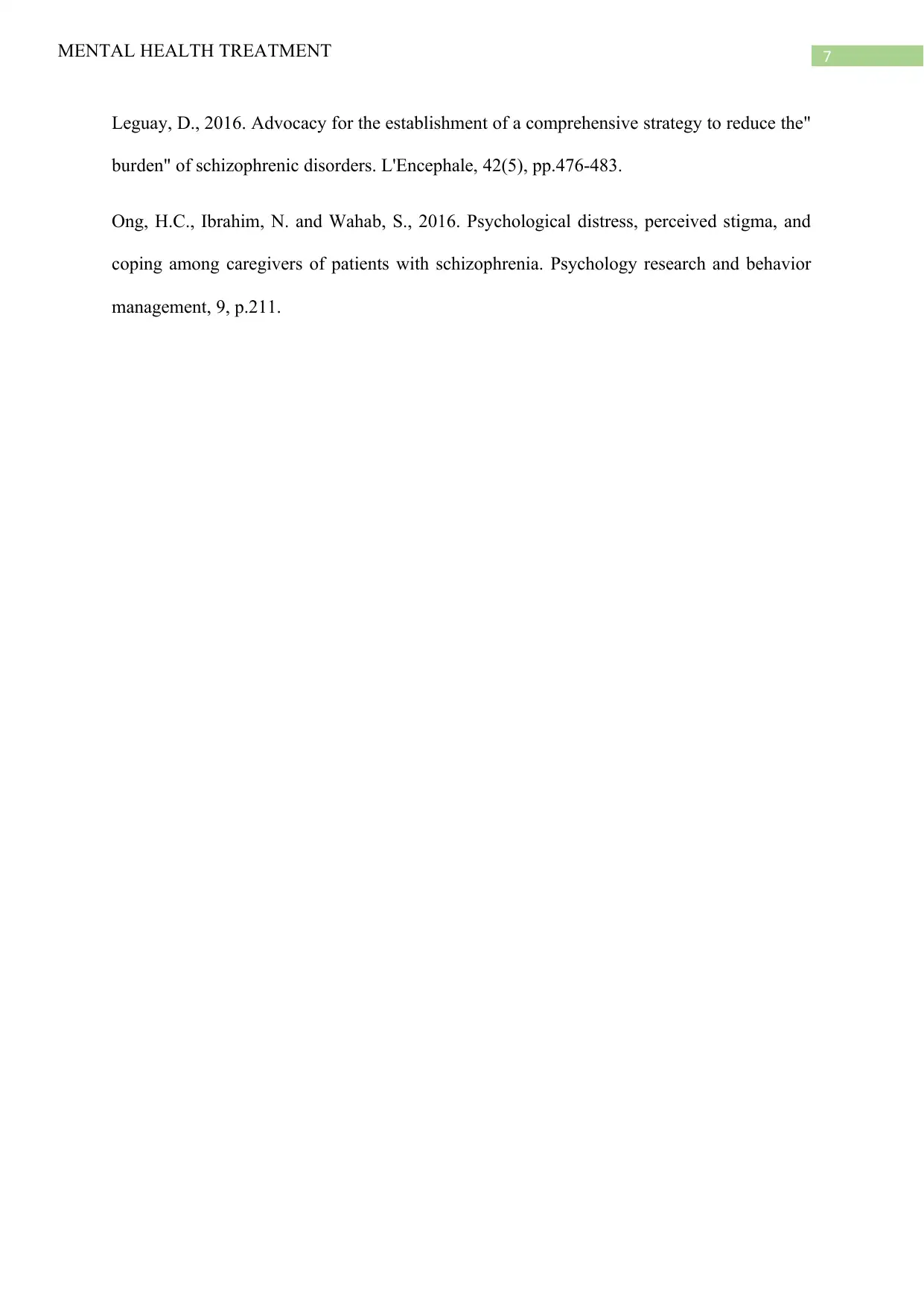
7MENTAL HEALTH TREATMENT
Leguay, D., 2016. Advocacy for the establishment of a comprehensive strategy to reduce the"
burden" of schizophrenic disorders. L'Encephale, 42(5), pp.476-483.
Ong, H.C., Ibrahim, N. and Wahab, S., 2016. Psychological distress, perceived stigma, and
coping among caregivers of patients with schizophrenia. Psychology research and behavior
management, 9, p.211.
Leguay, D., 2016. Advocacy for the establishment of a comprehensive strategy to reduce the"
burden" of schizophrenic disorders. L'Encephale, 42(5), pp.476-483.
Ong, H.C., Ibrahim, N. and Wahab, S., 2016. Psychological distress, perceived stigma, and
coping among caregivers of patients with schizophrenia. Psychology research and behavior
management, 9, p.211.
1 out of 8
Related Documents
Your All-in-One AI-Powered Toolkit for Academic Success.
+13062052269
info@desklib.com
Available 24*7 on WhatsApp / Email
![[object Object]](/_next/static/media/star-bottom.7253800d.svg)
Unlock your academic potential
Copyright © 2020–2025 A2Z Services. All Rights Reserved. Developed and managed by ZUCOL.





